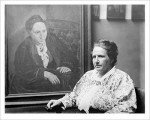Yes, We Have No Canon Today
***
I’ve been puzzling over a strange literary problem for some time now.
It has to do with the notion of the “best Canadian books” of the last
half-century or so. Here’s how it came about.
My publisher, Rolf Maurer of New Star Books in Vancouver, asked me to
write an introduction to a new printing he was doing–a sort of
slightly belated Silver Anniversary edition–of western Canadian writer
George Bowering’s 1980 novel, Burning Water. I was perfectly happy to do so because I think it’s one of the best Canadian books of the last 50 years or so.
In case you haven’t read or even heard of Burning Water, which, alas, is a perfectly possible state of affairs in this era of spotty literacy, I’d better say something about it and why it’s so great.
In the late 1970s, the intrepid Bowering temporarily dropped anchor in
the Italian port city of Trieste. Not only is Trieste his “favourite
city in the world,” as Bowering declares in a subsequent volume of
autobiographical essays, A Magpie Life, it’s also a well-known literary harbour that has provided, at various times, writing space for James Joyce, Italo Svevo and Claudio Magris, as well as the occasional wandering Canadian scribbler. I probably should also mention that at the time Bowering was voyaging in Italy, the greatest living Italian writer of the day, Italo Calvino, was planning his rollicking post-modern confection, If on a winter’s night a traveller.
Once Bowering was ensconced in that old “Hapsburg spy city of white
mountains, red roofs, and blue sea,” he began writing an unusual book
about the history of his own distant home port, the city of Vancouver.
That book is Burning Water, a comic, historical, postmodernist novel in which Bowering imagines the adventures of his partial namesake, Captain George Vancouver, and the English seafarer’s voyage in 1792 to the coasts and islands of what would become the Canadian province of British Columbia, including the inlet on whose shores a city bearing Vancouver’s name would in due course be established.
Bowering’s novel is motivated, I think, by the recognition that the
existential question, “Where are we?” has a particular urgency in our
time. That is, there’s a mundane and obvious sense of where we’re
literally located at any given moment, but in an era where so many
places are now designed as franchised replications of everywhere
else–so that in the end we’re often “nowhere”–figuring out where we
actually are demands an act of historical and creative imagination.
Further, understanding where we are and how we got there is inseparable
from who and what we are. Finally, the imagination of where we are is
not a parochial but a cosmopolitan enterprise: we locate ourselves in
relation to the world.
Burning Water begins, as it should, on the pristine wooded
slopes of Burrard Inlet, where two native men are talking about
“whatever it was, the vision that came out of the far fog and sailed
right into the sunny weather of the inlet” on a mid-June day in 1792.
It’s appropriate that the story begins with (and continues to be framed
by) the perspective of the native inhabitants who watched George
Vancouver’s tiny ships sail into those waters.
It’s here, at the outset, that Bowering makes his first crucial move.
Bowering’s natives are not the stereotypical aboriginals of Hollywood
epics talking a Hollywood Indian patois. They’re not even historically
realistic and politically correct “victims” of history. Instead, they’re witty postmodernist 18th century philosophe natives, and again, appropriately, they are arguing about the distinctions between fact and fancy, just as other contemporary philosophes might be doing in the salons of Paris. Is it a vision of giant birds, as the romantic youthful wannabe warrior claims, or just unfanciful wooden ships, as the older, wiser, native fisherman declares?
Immediately, we get the idea that Bowering’s playful picaresque is not
one of those typically earnest Canadian historical novels painfully
trying to “realistically” recreate the doomed wanderings of Arctic
explorers or the travails of frontier women in the prairie outback.
The point is, we don’t know what the aboriginals said to each other
when Vancouver’s ships appeared in Burrard Inlet, and we need a
storyteller to imagine some sophisticated banter to launch the tale.
Ditto for Captain George and his crew, despite the copious official
ships’ logs. At the end of the opening chapter, since this is a
“reflexive” novel (i.e., one that reveals its making alongside its
telling), we are introduced to the author, a version of Bowering
himself, wandering in the drizzle of a far-away city, gazing across the
northern end of the Adriatic.
Between the philosophe natives and a lonely author in Trieste, which establishes the parameters of Burning Water, the rest is a wonderfully drawn knockabout account of the 35-year-old Vancouver (who had sailed with the late Captain James Cook), and his fellow voyagers, principally Archibald Menzies, the Scottish ship’s botanist who is Vancouver’s bete noire, and equally important, Vancouver’s older Peruvian-born Spanish counterpart, the elegant Juan Bodega y Quadra, the secret hero of the novel. The whole tale of Vancouver’s triangular relations with Menzies and Bodega y Quadra is a tender, bawdy send-up of the so-called facts. Bowering’s cheerily vulgate (not vulgar) telling embodies the rhetorical idea of tapinosis, “the saying of very serious things in offhand language, in vernacular, even in slang,” as Bowering defines that term in Errata, a volume of his literary vignettes.
Although Burning Water won the 1980 Governor-General’s
literary award for fiction (in a year that also saw the publication of
Hugh MacLennan’s very under-rated last novel, Voices in Time, and Mordecai Richler’s Joshua Then and Now), it was not to everyone’s taste. As Bowering winkingly notes in one of his later books, Bowering’s B.C.,
the well-known Canadian archivist of the day, W. Kaye Lamb, grumbled in
a review that the author takes “only scant account of historical facts
and good taste… he has bespattered his pages with numerous errors of
fact that are both pointless and needless.”
The worthy Lamb obviously didn’t fully appreciate the tapinosis,
or the relation between fact and fancy. While the story is a funhouse
mirror representation, what the overly earnest archivist also missed is
that Burning Water is a shrewd and accurate political assessment of geopolitics and mercantile capitalism: Vancouver’s mission, along with Alexander Mackenzie’s contemporary overland journey to the Pacific, would set the stage for the dominance of the British fur trade in Canada.
Furthermore, Bowering is perfectly clear and historically precise about
Vancouver’s instructions: 1) to chart the northwest coast, which he did
more accurately than any sailor before him (filling in the gaps left by
Cook’s earlier mappings); 2) to prove once and for all that the fabled
Northwest Passage across North American waterways didn’t exist, which
it didn’t (although, two centuries later, with tragic irony and as a
result of global warming, there is now indeed a Northwest Passage
through the melting Arctic and it’s growing); 3) and to settle the
disputed claims to the coast between Britain and Spain, which had
established a fort at Nootka on what came to be called Vancouver
Island, but which Vancouver named Quadra and Vancouver Island, as a
token of his friendship with the Spanish commander. After that,
Bowering allows himself some fun with the duller details of personal
relationships. Once the geopolitics are established, fiction can play.
So, it’s the case that Vancouver and Quadra became friends, but only
imaginarily true that the relationship was a full-blown (no pun
unintended) affair. In any case, just as Bowering is prescient about
aboriginals, nothing that he says about homoerotics requires amendment
a quarter century later. Equally, Menzies and his botanical expedition,
a regular Enlightenment add-on to imperial voyages, is a fact, just as
it’s a fact that Menzies and Vancouver bitterly quarreled, although not
quite with the denouement that Bowering imagines for them. The “real” Vancouver died a few years later in England, at age 40, while writing up his Voyage of Discovery. But the point about Bowering’s version is simply this: it’s all there, and more.
Obviously, I think Bowering’s novel is a candidate for the Canadian
canon. That’s where my literary problem about the “best Canadian
novels” of the last half-century or so began. At the college where I
work as a philosophy instructor, I wandered over to the English
department and innocently asked if there was some book, like, say,
Harold Bloom’s The Western Canon, that listed, explained, defended, or whatever canons do, the best Canadian novels or the best Canadian books of the last quarter-century, half-century, or however long we’ve been canonizing.
I’ll skip most of the shaggy-dog version of this fruitless quest. There
was a lot of head-scratching, puzzled fumblings in dusty bookshelves, a
fusty list or two that had appeared in an obscure CanLit journal was
referred to, but in the end it amounted to, “Yes, we have no canon
today.”
“What about Northrop Frye, didn’t he write something?” I persisted.
“Hmm, er, well, not quite.”
“Or Atwood?”
“Oh, that was long ago and about thematics.”
“Uh, wait, maybe Frank Davey or Linda Hutcheon or…”
“No, sorry.”
About the best the English Department could do was direct me to W.H. New’s History of Canadian Literature (second edition, 2003), an admirable work that I duly read, but which, given the nature of Prof. New’s immense task, was mostly names and titles and thumbnail sketches.
I tried another tack. Okay, since Bowering’s book is “postmodern,” a contemporary of Calvino’s If on a winter’s night a traveller…, when did postmodernism begin in Canada? Trudeau-like postmodernist shrugs ensued. Alright then, what about modernism in Canadian prose? When did that start? More shrugs. Well, literary periodization tends to be “belated” in Canada, I was told. Anyway, the “canon debate” of the 1980s and ‘90s was never as big a deal here as in the U.S. And in any case, no one is really all that interested these days.
Apparently, about the only way a Canadian book can make a claim to
worthiness, much less a claim to being a candidate for canonicity, is
simply to be in print. That’s one of the reasons I’m glad that Bowering’s Burning Water has been reprinted.
.
Vancouver, Dec. 15, 2007. An earlier version of this essay apeared in Books in Canada. Stan Persky’s new book is Topic Sentence: A Writer’s Education (New Star, 2007). George Bowering’s Burning Water (New Star, 2007) is also in print.


